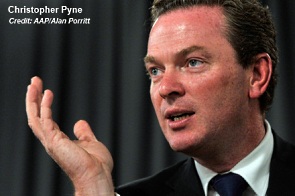|
News & Views item - December 2011 |
![]() Is it a Case of the Blind Berating the Maimed? (December 8, 2011)
Is it a Case of the Blind Berating the Maimed? (December 8, 2011)
Last night the Liberal-National Coalition spokesman, Christopher Pyne, delivered
the David Davies Memorial Lecture in Brisbane at a Liberal Party function. In it
he attacked the minority government led by Julia Gillard for overseeing "Our
universities have fallen in international comparisons in the last six years,"
citing the rankings by Times Higher Education in which only two of the Group of
Eight universities are included in the top 50 (they are ranked 59 and 62 by the
Institute of Higher Education of Shanghai Jiao Tong University, China).*
attacked the minority government led by Julia Gillard for overseeing "Our
universities have fallen in international comparisons in the last six years,"
citing the rankings by Times Higher Education in which only two of the Group of
Eight universities are included in the top 50 (they are ranked 59 and 62 by the
Institute of Higher Education of Shanghai Jiao Tong University, China).*
__________________________________
A full transcript of Mr Pyne's address is available at:
__________________________________
Text of Mr Pyne's address includes: "We need to at least get the Group of Eight universities back into the highest 50 ranked universities worldwide in the next four years." and he indicated that a Coalition government would "preside over a new world-class university focused on minerals and resources: "It is surprising that Australia does not have one specialised world-leading university that focuses almost exclusively on research in this area."
Mr Pyne then revisits the suggestion of non-research, i.e. teaching only institutions and favours that those universities that have what he sees as having minor research components should be encouraged to focus on teaching, but then notes that the 30 or so non- Group of Eight universities who win only a minor share of the research funding are "predominantly teaching and not research-focused," and makes the commitment that the: "tradition of learning for its own sake, the gaining of knowledge as opposed to training, as espoused by Newman, Menzies and Dulles, is worth reaffirming. It will form the centrepiece of the Coalition’s policy in relation to places of higher learning in the years ahead. We do, in my view, run a risk of universities becoming merely a set of narrow vocational training programmes unless we maintain standards that enable universities to devote attention to research, higher learning and scholarship."
Considering the federal government's handling of the nation's universities during the Howard year's just what the implementation of Mr Pyne's view would take is a moot question.
Interestingly, Mr Pyne takes the same path that is taken by Senators Carr and Evans in treating universities as institutions separable from their academic staff (faculty), and fasten on an approach of retrospective, second-guessing. The Howard Coalition played with the Research Quality Framework, while the Rudd/Gillard Labor governments have allow(ed) Senator Carr to fiddle with its "rebadgement", Excellence in Research for Australia.
Meanwhile the crying need to truly rework the peer-review systems of the funding councils and to proactively recognise that supporting research requires full, adequate funding of research groupings headed by their principal investigators as well as assuring attractive resourcing of young, promising investigators.
And then there is the matter of the nation's educational infrastructure of which Australia's first Nobel Laureate in physics in 96-years notes: "If you improve education for kids in primary school you get 50 years of benefit, but it doesn't accrue for another 10 or 12 years." And who at the age of 13, when his family moved to Alaska entered Bartlett High School in Anchorage.
In that public high school he found mentors, all science teachers, with whom he is still in touch. "Not only did they have science degrees of some description and most of them had masters degrees and even some work towards PhDs, but they had this great attitude and camaraderie. They would discuss with each other how they were going to teach something. This is a high school."
_____________________________________________________
*To quote Mr Pyne in full on the subject:
In world university rankings in 2011/12, the respected British journal The Times Higher Education Supplement listed only two of Australia’s universities in the highest fifty rankings – the University of Melbourne and the Australian National University. There were six amongst the highest fifty in 2004 during the Howard Government – the University of Melbourne, ANU and also Monash University, the University of New South Wales, the University of Sydney and the University of Queensland. (The University of Adelaide came in at fifty sixth and the University of WA at ninety sixth.)
However, if you're playing the ranking's game: according to the Institute of Higher Education of Shanghai Jiao Tong University, in 2004 ANU ranked 53, Melbourne 82 and no other Australian university ranked in the top 100 of the world's research universities.
In 2011 the rankings were: Melbourne, 60; ANU, 70; Sydney, 96.